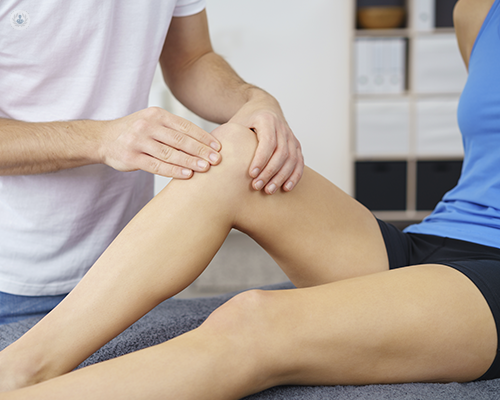ACL injuries: your FAQs
Written by:An anterior cruciate ligament (ACL) injury is the most common knee ligament to be injured. It occurs in about 1 in every 3000 people. Read on to learn the answers to common questions, as answered by Mr Jonathan Walczak, a revered consultant orthopaedic surgeon who has treated many cases of ACL injuries over the past 25 years.

Who is most at risk of this injury?
Anterior cruciate ligament (ACL) injuries happen more commonly in contact ball sports in men and downhill skiing in women. This type of injury is three times more common in women than men overall. This is due to differences in anatomy between genders and the fact that women tend to be more flexible than men (on average). It’s also more common in people who are less fit, or who have not trained for their sport adequately.
It’s a sports injury that is common in sports with jumping, cutting, landing on a flexed knee and rotating, rotating on a planted foot during a tackle or rotating with a ski binding that hasn’t released.
What happens if I leave an ACL untreated?
When untreated, there is an increased risk of developing torn cartilage/meniscus. This occurs in up to 40% of people. Also, there is an increased risk of arthritis in the knee over ten to twenty years afterwards, due to the instability of the knee.
How do I know my ACL is injured?
It is very common for there to be:
- a pop or a snap
- sudden pain due to bleeding into the joint
- immediate swelling and limping
This is in contrast to cartilage injuries which more often swell up the day afterwards.
Can you still walk on an untreated ACL tear?
It’s possible to walk upon your ACL after tearing it, albeit with some pain. Often, this pain is at the outer back of the knee and some people show symptoms quite late, having underestimated its nature.
If this has happened to you, you cannot put bear weight on your knee for more than few days and the knee feels unstable, you should seek medical advice from a physiotherapist or surgeon and have a full assessment with an MRI (magnetic resonance imaging) scan.
Do all ACL tears need surgery?
The good news is that not everyone needs to have surgical reconstruction after an ACL injury. The need for reconstruction depends on:
- your age
- fitness level
- if you plan to play sports
- how well you do with physiotherapy
In large surveys, between a third and half of people have been able to enjoy an active life without having surgery, but usually having had a course of physiotherapy.
Physiotherapy and rehabilitation are recommended for most people. The goal of these is to get the knee moving and to build up strength. Reconstructive surgery is reserved for people who have ongoing instability and pain or who play sport to a high level and want to return as soon as they possibly can.
If I don’t have surgery, can I continue playing sports as well as before?
It is certainly possible to return to sports after an ACL injury without surgery, but this would usually be sports such as running, swimming, gym, or another activity in which you are moving in a straight line.
What are the long-term effects of a torn ACL?
Any activities involving sudden changes in direction when moving rapidly or jumping and landing on a bent knee, such as football, hockey, lacrosse, rugby etc. would be difficult.
What does surgery involve?
ACL reconstruction surgery usually involves taking the hamstring tendon from the same leg and using it to make a new ligament. This results in a day in hospital and several months of physiotherapy afterwards. Surgery and intense rehabilitation will get 80% of people back to their chosen sport.
For more information about ACL injuries and other conditions involving the hips, knees and feet, please see my website.
Are you experiencing aches or pains in your hips, knees, or feet? Schedule a consultation with Mr Walczak by visiting his Top Doctors profile.


